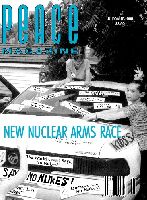
Peace Magazine Jul-Aug 1998, page 30. Some rights reserved.
Search for other articles by Ken Simons here
George F. Wright Ottawa: Fomorian Press 1997, 192 Pages. Isbn 1-894083-01-6.
What is literacy, and how does it fit into the development of civil society? To answer these questions, look at who is doing the defining. Then we can move towards a definition of our own.
Governments have defined literacy in ways which serve their own purposes: even today, most Western nations still maintain the fiction that over 95 % of their citizens are "literate." More enlightened states might speak of functional literacy - the ability to use written language as a tool for social interaction. Some might even speak of numeracy, "computer literacy," and even "semiotic literacy" as elements of a broader social fluency. Few government spokespeople would, however, speak of the links between social literacy and grassroots democracy.
George Wright, a specialist in democratic development who spent years in the early 1990s researching community-based education programs in Latin America and Canada, defines literacy as
...the indispensible beginning of a popular education process which is meant to develop an individual's capacity to think critically, thereby enabling formerly marginalized people to work democratically from within popular organizations towards advancing their economic, social and cultural rights.
Literacy: Key to Democracy in the Americas draws on established theoretical work, in particular Paolo Friere's popular education methods, but also on the new importance given to economic literacy as communities respond to the centralization of economic power throughout the Americas.
Economic literacy is, of course, much more than a metaphor when a community's education needs run deep, whether through systematic neglect (as has happened in indigneous communities from the Arctic to Patagonia), through economic dislocation (Cape Breton Island is the site of one of Wright's case studies), or through the specific educational and social obstacles facing refugees and immigrants. Wright's thesis is that community-based literacy work can set the conditionss for a broader and more integrated local activism.
This book is useful both as a sourcebook on non-governmental education and development programs, and as a personal interpretation of the challenges facing communities at this historical moment. Perhaps its most refreshing feature is the lack of dogmatism - behind the bewildering range of acronyms there is a wealth of creative thinking on development, education, and "taking back the power."
Reviewed by Ken Simons

Peace Magazine Jul-Aug 1998, page 30. Some rights reserved.
Search for other articles by Ken Simons here